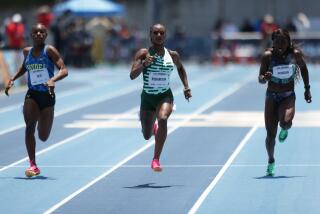Mark Conover Isn’t Running Short Anymore
- Share via
SAN FRANCISCO — Little-known marathoner Mark Conover was about to have his car repossessed. His credit-card charges were pushing the limit and, at age 27, he was jobless and in debt to his parents up to the top of his nylon running singlet.
That was all before he “bagged the elephant,” as he puts it with a grin, on a blustery day in the urban wilds of northern New Jersey.
Now Conover is $50,000 richer, has a contract and an agent and is besieged by new friends and reporters who want to talk to the U.S. Olympic men’s marathon trials winner.
The San Luis Obispo runner and northern California native thinks his next big-game “trophy” could be gold, silver or bronze. But he’ll be able to pay his bills and keep racing regardless of the outcome, thanks to his stunning victory on April 24.
“It’s been a life-changing experience,” he said in an interview, still savoring his long-sought breakthrough in a major race.
“I went from living hand-to-mouth to being completely on the other side of the fence. . . . It’s real satisfying.”
Conover’s emergence as a competitive world-class runner was so sudden that it caught the commentators for the nationally televised race unprepared.
As the 5-foot 10-inch, 134-pound Conover took the lead at the 17-mile mark of the trials in the New Jersey Waterfront Marathon, the ABC-TV announcers knew only his hometown and the fact that only a dozen of the 108 starters had slower qualifying times. He was pegged as likely to fade.
But the unimpressive time of 2 hours 18 minutes 3 seconds recorded in his debut marathon in Sacramento last December came in a gale-force rainstorm. And he and his coach shared inside information: A combination of ingredients give him the potential for greatness at the 26.2-mile distance.
“He has all the necessary juices that go into running a marathon,” said Jim Hunt, who coached him to National Collegiate Athletic Assn. Division II championships in the 10,000-meter and cross-country runs for Humboldt State in the northern California town of Arcata.
“He has a very efficient running style, he had run some very good 10Ks and 15Ks, and he is very, very tough mentally,” said Hunt, now retired but still coaching his prize student.
Conover, who barely lifts his knees in his short, quick stride, showed both mettle and speed late in the trials race.
Cruising through 4:53 miles with Ed Eyestone to make it a 2-man contest, he eventually pulled away and won by 23 seconds in a wind-slowed 2:12:26. Eyestone and third-place finisher Pete Pfitzinger, the 1984 trials winner, also qualified for Seoul.
The performance once would have been inconceivable for the runner who quit his high school cross-country team in Orinda, 15 miles east of San Francisco, because it “hurt so bad.”
He went out for track the next spring and finished fifth as a senior in the 2-mile run at the state high school championships. He wound up at Humboldt State, a small school with a strong distance-running tradition, only because no university offered him a track scholarship.
The two collegiate titles and moderate subsequent success--he ran in the 10,000-meter Olympic trials in 1984 and has a personal best of 28:30--whetted his appetite for more.
It has been a long time coming for Conover, who turns 28 on May 28.
Along the way he has mostly remained unemployed and in debt despite holding two degrees--a bachelor’s in natural resources planning from Humboldt and a master’s in city and regional planning from Cal Poly San Luis Obispo.
Training full-time has been necessary because “it’s hard to work and be a world-class runner, and that’s what I wanted.”
Not everyone was sympathetic.
“I had to put up with a lot of hassle--being poor, people thinking I was a bum. Now (since the trials), everybody’s my buddy, but there are a lot of people who didn’t really believe I could do what I did,” Conover said.
“In a way I can understand it,” he shrugged. “That’s the capitalist society we live in--people question what you’re doing with your life if you’re not making a lot of money and buying a house by the time you’re 30.”
Pursuit of his running career has been cautious because of injuries in college and Achilles’ tendon surgery that forced an 8-month layoff in 1985. Only after he began running consistently last summer did he feel ready to finally try the distance he knew he could excel at, and he finished third in the California International Marathon.
Conover’s goal now is to stay healthy and win a medal in the Oct. 2 Olympic finale. He is trying to stay fresh by avoiding competition and running a relatively low 80 miles a week.
“I have a shot at it. I figure I’m as good as anybody in there,” he said confidently.
More to Read
Go beyond the scoreboard
Get the latest on L.A.'s teams in the daily Sports Report newsletter.
You may occasionally receive promotional content from the Los Angeles Times.






